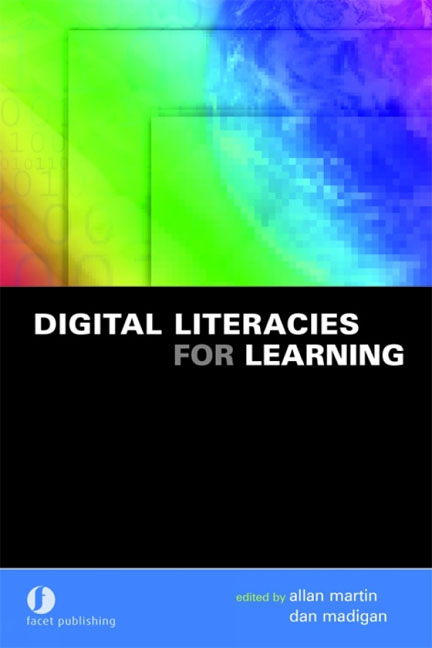Book contents
- Frontmatter
- Contents
- Dedication
- The contributors
- Foreword
- Preface
- Part I Literacies in the digital age
- Part II Enabling and supporting digital literacies
- 12 Supporting and enabling digital literacy in a global environment: preview of Part 2
- 13 A ‘dense symphony of the nation’: Cymru Ar-Lein and e-citizens and e-communities in Wales
- 14 The impact of information competencies on socio-economic development in Southern Hemisphere economies
- 15 Supporting students in e-learning
- 16 The information commons: a student-centred environment for IT and information literacy development
- 17 Socio-cultural approaches to literacy and subject knowledge development in learning management systems
- 18 Approaches to enabling digital literacies: successes and failures
- 19 Professional development and graduate students: approaches to technical and information competence
- 20 Windward in an asynchronous world: the Antiguan initiative, unanticipated pleasure of the distance learning revolution
- 21 A tale of two courses
- Index
14 - The impact of information competencies on socio-economic development in Southern Hemisphere economies
from Part II - Enabling and supporting digital literacies
Published online by Cambridge University Press: 08 June 2018
- Frontmatter
- Contents
- Dedication
- The contributors
- Foreword
- Preface
- Part I Literacies in the digital age
- Part II Enabling and supporting digital literacies
- 12 Supporting and enabling digital literacy in a global environment: preview of Part 2
- 13 A ‘dense symphony of the nation’: Cymru Ar-Lein and e-citizens and e-communities in Wales
- 14 The impact of information competencies on socio-economic development in Southern Hemisphere economies
- 15 Supporting students in e-learning
- 16 The information commons: a student-centred environment for IT and information literacy development
- 17 Socio-cultural approaches to literacy and subject knowledge development in learning management systems
- 18 Approaches to enabling digital literacies: successes and failures
- 19 Professional development and graduate students: approaches to technical and information competence
- 20 Windward in an asynchronous world: the Antiguan initiative, unanticipated pleasure of the distance learning revolution
- 21 A tale of two courses
- Index
Summary
Abstract
This paper discusses the North–South knowledge gap and its relationship to socioeconomic development, information development, education and information literacy. Information development – the information progress of a country – is analysed using indicators of production, storage and demand of recorded information/knowledge. Most concepts are discussed from the point of view of developing countries – nations that basically fall within the Southern Hemisphere. The term ‘developing economies’ is used to group middle-, low- and lowest-income nations that share general characteristics but also have several differences even within their own regions/states. The analysis is simplistic and does not attempt to give a full conceptual scientific explanation of North–South knowledge gaps. The term ‘literacy’ is used to denote the various competencies that citizens are required to master at a basic level. The most familiar meaning of literacy is the one related to basic reading and writing. However, literacy has become a common word to denote elementary skills that are needed by most, if not all, members of society, such as information literacy.
Text originally presented as the Mortenson Distinguished Lecture, at the Mortenson Center for International Library Programs, University of Illinois at Urbana-Champaign.
Information development
The development of a nation can be measured according to the dissemination of information because it shows how a country generates and uses knowledge, especially the printed type. Recorded knowledge has a production cycle: authors, inventors and researchers generate information and knowledge in the form of arti-cles, books, texts and patents that are then processed by publishers, database builders, webmasters and electronic media companies. Processed information is, in turn, stored and distributed by bookstores, libraries and other information providers to meet the demand (if the proper competencies to use information are present) of researchers, faculty, students, companies and society in general (see Figure 14.1). It is assumed that citizens need a working knowledge of the social, economic and political activities of their own country to improve their personal, family and business life. If this is true, it is also assumed that information literacy is a crucial set of skills that enables individuals to benefit from the wealth of knowledge available in paper or electronic format, and that these competencies are basically fostered by the country's educational system.
- Type
- Chapter
- Information
- Digital Literacies for Learning , pp. 152 - 161Publisher: FacetPrint publication year: 2006
- 1
- Cited by



